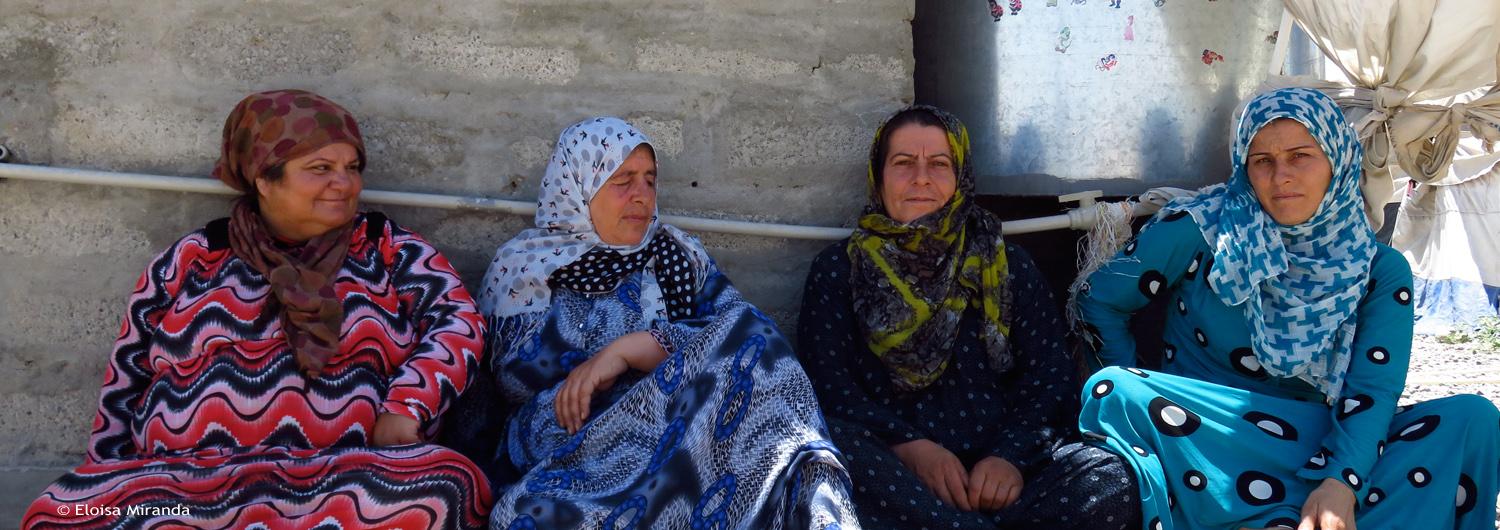Stories
Meeting Fatima

World Refugee Day
Fatima (pictured second from left) arrived in Iraq’s Gawilan refugee camp from Kobane, in Syria, in February this year with her three children – all boys, aged 10, nine and seven. The mother-of-three and her children were forced to flee after the arrival of the Islamic State in her village and the subsequent death of her husband, who was killed during fighting.
Fatima speaks Arabic, Kurdish, and also Turkish because she has spent some time in Turkey during her lifetime. She tells us that in trying to escape the Islamic State she first tried to reach Turkey with her children and some other people who were fleeing, but Turkey did not immediately let them in. They spent one week at the border in very difficult conditions. After seven days they were let in, but only spent 12 hours in the country, before heading to Iraqi Kurdistan. She arrived to Gawilan camp, while others travelling with her went on to other refugee camps.
Although the front line is just seven kilometres from Gawilan camp – sometimes it is possible to see the smoke of the rockets and hear the sound of fighting – in the camp she feels safe and life, she says, ‘is fine’. The children go to school, and now that school is closed for the summer holidays they go to the camp’s Mosque to learn about Islam. She tells me her relationship with her neighbours is good, they support each other, and the children play together. “Leh moushkila (there is no problem),” she says. “The only problem is ISIS”.
When we asked her what it is like to be a refugee and if there is something she would like people in Europe to know about their situation, she just shook her head. “This is not life,” she said. “We don’t do anything, we have no money, no place to go and we don’t know what tomorrow will bring, when all this will be over.”
Living in a tent in July and August, even with a small fan, is extremely difficult, she adds, as temperatures threaten to reach 50 degrees Celsius. “It’s not like a house,” she said. “If you have a house you can open the windows and even if it is hot you have wind. In a tent, if you open the windows all you have is dust.”
We listen to her while drinking her strong coffee, in her tent. Fatima looks extremely tired and her face carries the signs of the ordeal and suffering she has been through. Despite everything though, her eyes spark with force and determination: life is harsh now, but it is temporary and she must stay strong for the future of her children.
The youngest boy arrives. His hair is extremely blond and he has spots on his face due to the sun. Our psychological and social worker Azad recognises him as one of the children participating in our mental health care activities.
Fatima suffers from heart problems, and she has been to visit the camp’s health clinic, which is managed by a non-governmental organisation called PU-AMI. We tell her we will come to visit her and check on her, and inform her of the recreational activities she could do with our teams, as she is not aware of them. She says that she might try to come when her children are at the Mosque. We really hope she will.
She says goodbye to us with the only words she knows in English: “Thank you. I love you”, and I answer with two of the few words I know in Arabic: “Shoukran. Ile’lekha” (which means, 'thank you, see you later').
Action Against Hunger has been running water, sanitation and hygiene programmes – including ensuring access to clean, safe water and latrines, in Gawilan camp with Unicef support. We are now establishing mental health and care practices there to support young children and their families – many of whom have experienced great trauma – with the UN Refugee Agency.
JOIN US
Donate now
Your donation will reach those who most need it
Become a member
Join the generation that can bring an end to hunger
Donate via SMS
send HAMBRE to:
- 28010(1.2€)
- 38010(6€)
- 38012(3€)
Full donation to our projects. Valid for Movistar, Vodafone, Orange and Yoigo